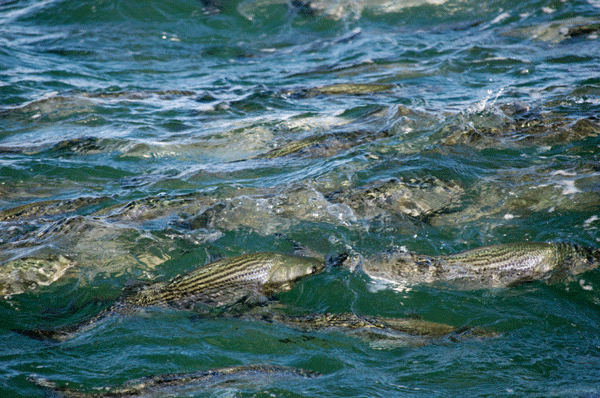
|
Third-Party Certification Puts a Blue Ribbon on Depletion of Critical Striped Bass Food Source
It is negligent to certify Omega Protein’s menhaden purse-seining operation as sustainable when striped bass populations are in decline, says TRCP.
The Marine Stewardship Council, a private international institution, has determined it will grant a certification of sustainability to Omega Protein Corporation for its U.S. Atlantic menhaden purse-seining operations, despite the fact that the industrial harvest of these important forage fish depletes the east coast’s striped bass population.
Menhaden are small, oily baitfish that form the base of the Atlantic food chain, supporting every marine sportfish from stripers and bluefish to tarpon and sharks. As filter feeders, they also benefit water quality in places like the Chesapeake Bay.
Reduction fishing—where menhaden are caught in giant nets and then “reduced” for meal, fish food, and other products—was once common on the east coast, but it is now banned in every state except Virginia because of the destructive nature of the fishery. Today, a single company, Omega Protein, accounts for 80 percent of the coastwide catch of menhaden, and this level of harvest could be responsible for as much as a 30-percent reduction in striped bass, the nation’s largest marine recreational fishery.
“This week’s announcement from MSC puts a blue ribbon on the last holdout of an antiquated and harmful reduction fishing industry,” says Whit Fosburgh, president and CEO of the Theodore Roosevelt Conservation Partnership. “This certification ignores what’s really happening to east coast sportfish, which rely on menhaden for survival and support a thriving recreational fishing economy. You cannot mine the base of the food chain and not expect it to affect every species that depend on those fish.”
MSC’s published assessment makes it clear that the certification is conditional, meaning that Omega has to meet certain milestones over the next four years—they have not met these milestones yet. Omega Protein has strongly opposed conservation measures, including current catch limits in the Chesapeake Bay.
The Atlantic States Marine Fisheries Commission, the federal and state governing body charged with managing menhaden, is developing a management model where it considers the fish’s role in the entire ecosystem and the impact of menhaden harvest on other species. Until these updates are complete, it is too soon to make a ruling on the sustainability of commercial menhaden harvest.
“It is negligent to call Omega’s operations sustainable now on the condition that the company meets certain milestones in the future, especially considering the important changes that fisheries managers are committed to making,” says Fosburgh. “This is actually about the foreign-owned company’s willingness to pay for a certification as a PR boost. It won’t fool America’s anglers, and we plan to formally object through the appropriate channels.”
The TRCP is calling on sportsmen and women to sign this open letter to MSC opposing the certification.
Learn more about the menhaden’s role in supporting sportfishing opportunities.